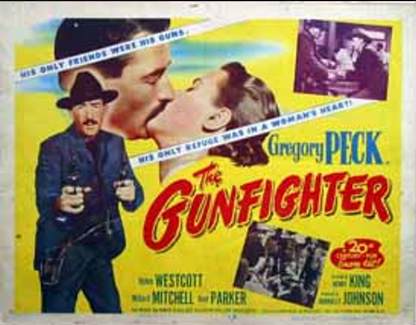
THE GUNFIGHTER
US, 1950, 85 minutes, Black and white.
Gregory Peck, Helen Westcott, Millard Mitchell, Jean Parker, Karl Malden, Skip Homeier, Ellen Corby, Richard Jaeckel.
Directed by Henry King.
The Gunfighter has become something of a classic western, a portrait of the ageing and retiring gunfighter. It draws on the traditions of the west and its lawlessness, the significance of the gunfighter, his solving problems, but his working outside the law and creating fear. It is ironic that Gregory Peck was only thirty-four when he made this film as the retiring gunfighter.
Gregory Peck is a solid presence in his films. He had been acting in films for about seven years at this time including The Keys of the Kingdom, Valley of Decision, Spellbound, The Yearling, The Paradine Case.
There is a good supporting cast including Karl Malden and other veterans of westerns.
The film has the popular ingredients of the western town: the people wanting to see the killer, everybody talking about his exploits, the marshal keeping the peace, Ringo, the gunfighter, wants some time to see his sweetheart whom he has not seen for eight years and the son whom he has never seen. To complicate the matters, three cowboys are pursuing him, and a youngster in the town wants to test how fast Ringo actually is.
The film was directed by Henry King and written by William Bowers, a veteran of screenwriting for almost forty years from the 40s to 1980, and film director Andre de Toth who made a number of westerns himself. Henry King had been directing films since 1913 and was to make his mark in many of the films of the 1930s. Films which stand out include Jesse James, Stanley and Livingstone, Lloyds of London. During the 1940s he directed a number of high profile films at Twentieth Century-Fox? including The Black Swan, The Song of Bernadette and Wilson. He did action adventures like The Captain from Castille and Prince of Foxes. During the 1950s he made a number of Cinemascope films including Love is a Many Splendored Thing, King of the Khyber Rifles, the Hemingway films The Sun Also Rises as well as the Rodgers and Hammerstein Carousel. His last film was Tender is the Night which he directed at the age of seventy-six.
1. How good a Western? The American traditions of the Western - and the place of this film in 1950? The disillusionment with some of the memories of the West? The film was considered to have been something of a classic at the time. Its impact now?
2. Black and white photography, the re-creation of the Western town, its atmosphere, people, customs? The deal for peace and the arrival of the gunfighter? How well did the film sustain this atmosphere?
3. The portrait of Cheyenne as a Western town? Its origins in the troubled times, the fact that it was now settled, the ladies and their comments on the type of town that it was? The Marshal and him control of the town (despite his gunfighter past)? Aspects of civilization, shops, homes, school? That violence was a thing of the past? The comment on the transition from the wild West to the more settled west and the insight into the American violent Western heritage?
4. Ringo coming into this situation - the aging cowboys, the gunfighter past his prime, his memories of the violence and its effect on him, his regrets of the kind of life that he had led? Ringo and his remembering the past, his hopes for the town and his willingness to change? How well did Gregory Peck bring his classic style to this performance?
5. The gunfighter as the target for would-be assassins risking violence and reputation? The portrait of the men pursuing him? The inevitable assassin and his inevitable death? The pathos and the irony of Ringo's death as he was about to start again? The regrets of the American heritage?
6. The portrait of Ringo, strengths and weaknesses? Wife and son? Memories of the past? their settling down in the town under assumed names, their peaceful future? The repercussions of the discovery of the truth? His wife saying it was too late? What made her change her mind? Her hopes for his serving some time and then starting afresh? The possibilities for a happy life?
7. Ringo's friendship with the Marshal, remembering the past? The changes that had occurred? The Marshal showing the possibility of a fruitful life in a Western town?
8. The portrait of the women in the town, the ladies, the contrast with Molly and the old style saloon girl?
9. The atmosphere of anxiety and the way this was portrayed? the people and their fear of violence, their having to cope? Their hostility towards Ringo for disturbing the peace?
10. The irony of the ending with the hopes and possibilities cut short by death?
11. What valuable insights did the film offer on the American Western tradition, the people of the West, violence, the heritage?